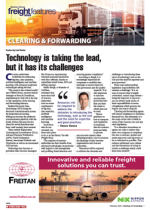Customs authorities worldwide are embracing big data, data analytics, artificial intelligence and machine learning, with advanced analytical technologies taking the lead.“This trend is also evident locally,” says Clifford Evans, customs liaison manager at Berry & Donaldson, emphasising its vital role in the day-to-day operations of the clearing and forwarding industry. Besides Electronic Data Interchange (EDI) being the electronic communication system for declaration processing, eFiling has become the preferred communication platform with the South African Revenue Service (Sars) for several functions that have, until recently, been manual. These include Registration Licensing and Accreditation (RLA), Advance Payment Notification (APN), Travel Declaration System, Automated Refunds and Drawbacks as well as an Automated AEO process. Technology has become so prevalent that customs managers like Evans are experiencing minimal personal interaction with Sars officials, thanks to centralised email boxes, EDI and eFiling systems.Renko Bergh, co-founder of CtrlFleet, estimates that more than half of customs authorities now use some combination of big data, data analytics, artificial intelligence and machine learning. “And those who do not currently use them have plans to do so in the future,” he tells Freight News. “The majority of customs authorities see clear benefits from advanced technologies, in particular with regard to risk management and profiling, fraud detection and ensuring greater compliance.” According to Bergh, it is increasingly important for companies to establish data strategies to ensure improved data governance and the quality required. “It is also important to take into account data protection laws that can limit the extent to which data can be used. “Better guidance on how to interpret such legislation in analysing data for customs purposes helps to prevent any excessive caution when designing projects, and to promote the exchange of data between organisations and customs authorities. “Resources will be required to address the obstacles and challenges to introducing these types of technology, such as the cost and the need for expertise and good practices.”Evans says understanding legislation responsibilities still remains a challenge: “It is an area of concern that is largely overlooked. Actual cargo owners – being the importer or exporter – are not always made aware of their responsibilities in terms of legislation which governs the import and export of goods. “Clearing and forwarding agents will ensure compliance to minimise financial loss, but ultimately, it is the cargo owner who is liable in terms of the Customs Act and any other legislation. “It is therefore incumbent on agents not only to ensure that their own company is compliant, but also to educate, update and assist importers and exporters to be as informed as possible. This reduces additional costs, delays and the frustration of trying to resolve a challenge which could have been avoided.”

